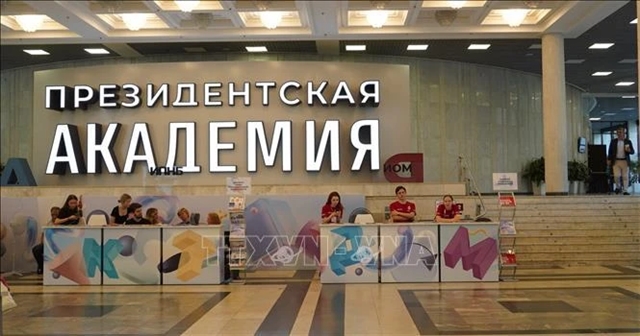 Politics & Law
Politics & Law


|
| The Russian Presidential Academy of National Economy and Public Administration (RANEPA or Presidential Academy) is the largest educational institution in Russia. VNA Photo |
MOSCOW – During his theoretical research career, Party General Secretary Nguyễn Phú Trọng was a post-graducate student at the Russian Presidential Academy of National Economy and Public Administration (RANEPA or Presidential Academy) - the largest educational institution in Russia.
From August 1946 to 1991, the academy was called the Soviet Academy of Sciences (AON) under the Central Committee of the Communist Party of the Soviet Union. During the period, Vietnam sent many ideological theorists to study and do research there.
In September 1981, Trọng was sent to the Soviet Union as a research fellow, where he did his Candidate of Science (now Doctoral) dissertation in Historical Science (Party-Building major) at the AON. His classmates at the time still kept fond memories of the young Vietnamese researcher.
Leader of the Communist Party of the Russian Federation (KPRF) Gennady Zyuganov, who was a classmate of General Secretary Trọng at AON recalled that he and Trọng took the same courses, went to the same lecture hall, were tested by the same teachers and attended conferences and meetings together.
Trọng looked gentle and friendly and he spoke Russia quite well, Zyuganov said, noting that as a leader, he is very principled and steadfast. He expressed his joy when the Vietnamese people presented the world communist movement with such a talented, knowledgeable, hard-working, sincere, and deserving leader.
The thesis on activities of the Communist Party of Việt Nam to strengthen relations with the masses in the current period (based on the experience of the Communist Party of the Soviet Union) of the Vietnamese Party leader is now displayed in the library of the academy along with other research books on Việt Nam which are usually sought by students for reading.
Natalya Shafinskaya, head of the International Development Department of the Presidential Academy, said that the academy is proud and honoured to train many leaders of other countries, with General Secretary Trọng of Việt Nam among them.
Lê Huỳnh Đức, President of the Vietnamese Students’ Association in Russia, a RANEPA graduate student, said that many people have read and use the dissertation of the Party leader for reference.
It can be seen that from the beginning of his career, General Secretary Trong had viewed the prestige of Party members among the people as one of the most important issues of the Party. In fact, when he held the top position in the Party, the General Secretary continued to pay great attention to the issue of transparency, and he had initiated and implemented the anti-corruption movement to regain the people's trust in the Party's leadership.
Việt Nam's successes in fighting corruption and economic development have become research topics at this academy.
Duc said that Russian academics have shown interest in the General Secretary's theoretical legacies. In scientific seminars at the academy, Vietnam’s "bamboo diplomacy" school also draws much attention.
Shafinskaya said that after hearing about the passing of the General Secretary, the Presidential Academy sent a letter of condolence and will send a delegation to the respect-paying ceremony held at the Vietnamese Embassy in Moscow to show respect for the former student who came from a country with countless difficulties but thrived with will and a thirst for knowledge, becoming a leader trusted by the people. VNS




